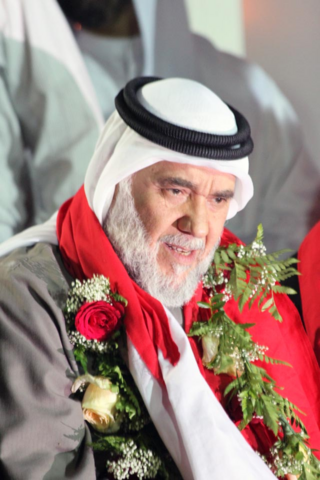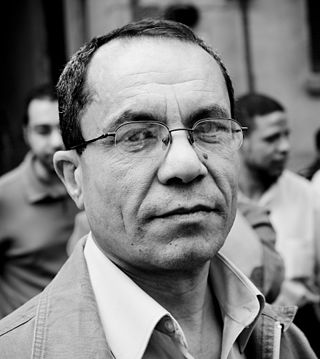Related Research Articles

Ahmed Ouyahia was an Algerian politician who was Prime Minister of Algeria four times. A career diplomat, he also served as Minister of Justice, and he was one of the founders of the Democratic National Rally (RND) as well as the party's secretary-general. He is considered by Western observers to be close to the military of Algeria and a member of the "eradicator" faction in the 1990s civil war against Islamist militants. Ouyahia resigned as Prime Minister in March 2019 following President Bouteflika's announcement that he would not seek reelection, and Ouyahia was arrested in June 2019 for crimes related to corruption. He was later convicted and was serving 19 years in jail.

Mansour Osanloo (Osaloo) is a trade union activist in Iran, where he was imprisoned several times from 2005 to 2008. Osanloo was then held in Evin Prison, serving a five-year prison sentence, and freed in June 2013. He is a founding member of the Syndicate of Workers of Tehran and Suburbs Bus Company, an independent union that has been campaigning for workers’ rights.

The Syndicate of Workers of Tehran and Suburbs Bus Company (SWTSBC) is a trade union centered on the Greater Tehran region. It has a membership of over 17,000 labourers; most of whom work for the United Bus Company of Tehran. Initially established in 1958, its activity has been intermittent throughout the years. The union gained notoriety after the 1979 Islamic Revolution after it openly engaged a regime that is often hostile towards independent worker organizations.
Human rights in Egypt are guaranteed by the Constitution of the Arab Republic of Egypt under the various articles of Chapter 3. The country is also a party to numerous international human rights treaties, including the International Covenant on Civil and Political Rights and the International Covenant on Economic, Social and Cultural Rights. However, the state of human rights in the country has been criticized both in the past and the present, especially by foreign human rights organisations such as Amnesty International and Human Rights Watch. As of 2022, Human Rights Watch has declared that Egypt's human rights crises under the government of President Abdel Fattah al-Sisi, is "one of its worst ... in many decades", and that "tens of thousands of government critics, including journalists, peaceful activists, and human rights defenders, remain imprisoned on abusive 'terrorism' charges, many in lengthy pretrial detention." International human rights organizations, such as the aforementioned HRW and Amnesty International, have alleged that as of January 2020, there are some 60,000 political prisoners in Egypt. Other complaints made are of authorities harassing and detaining "relatives of dissidents abroad" and use of "vague 'morality' charges to prosecute LGBT people, female social media influencers, and survivors of sexual violence". The Egyptian government has frequently rejected such criticism, denying that any of the prisoners it holds are political prisoners.

Human rights in Jordan are similar to or better than those elsewhere in the Middle East. Human Rights Watch reported in January 2018 that although recently there have been far-reaching reforms of the laws and regulations in the country, abuses against basic rights such as freedom of expression persisted.

Hasan Mushaima is an opposition leader in Bahrain and the secretary-general of the Haq Movement, an important opposition party in Bahrain. Before forming Haq, he was a founding member of Al Wefaq and a leading figure in the 1994 uprising in Bahrain. He has campaigned for more democratic rights in Bahrain, and has been in prison in Bahrain since his arrest in 2011.

Nasrin Sotoudeh is a human rights lawyer in Iran. She has represented imprisoned Iranian opposition activists and politicians following the disputed June 2009 Iranian presidential elections and prisoners sentenced to death for crimes committed when they were minors. Her clients have included journalist Isa Saharkhiz, Nobel Peace Prize laureate Shirin Ebadi, and Heshmat Tabarzadi. She has also represented women arrested for appearing in public without a hijab, which is a punishable offense in Iran. Nasrin Sotoudeh was the subject of Nasrin, a 2020 documentary filmed in secret in Iran about Sotoudeh's "ongoing battles for the rights of women, children and minorities." In 2021, she was named as of Time's 100 Most Influential People in the World.

Kamal Abbas is General Coordinator of the Center for Trade Unions and Workers Services (CTUWS), an activist group for independent unions in Egypt. Involved in activism for over 20 years, Abbas has been active in mobilizing worker support during the Egyptian Revolution of 2011 and its aftermath. His approach emphasizes peaceful strikes and rallies accompanied by demands for better wages and working conditions, as well as more regular elections for union officials, and an independent union system.

Mahdi Isa Mahdi Abu Deeb is the founder and leader of Bahrain Teachers' Association (BTA), and Assistant Secretary-General of Arab Teachers' Union. Due to his role in the Bahraini uprising, he was arrested, allegedly tortured, and sentenced to 10 years in prison. His sentence was later reduced to five years by an appeals court. Amnesty International designated him a prisoner of conscience.

Jalila Mohammed Ridha al-Salman (1965) is a Bahraini teacher and vice president of the Bahrain Teachers' Association (BTA). Due to her role in the Bahraini uprising, she was arrested for 149 days, allegedly tortured, and sentenced to 3 years in prison. On 21 September 2012, her sentence was reduced to six months' imprisonment by an appeals court.
Iranian Teachers' Trade Association is a trade union of educators in Iran. It is an affiliate of Education International and Esmail Abdi serves as its secretary-general.
The 2018 U.S. prison strike was a series of work stoppages and hunger strikes in prisons across the United States that began on August 21 and ended on September 9. The strike was conducted at least in part in response to the April 2018 prison riot at Lee Correctional Institution, which killed seven inmates and was the deadliest prison riot in the U.S. in the past 25 years.
Farhad Meysami is an Iranian physician, teacher and civil activist. He believes in non violence and civil disobedience. He was sentenced to five year sentence in August 2018 for crimes such as “spreading propaganda against the regime”. He was released in February 2023 after a four-month hunger strike that grew international attention.
The Haft Tappeh Sugarcane Agro-industrial Complex Labor Syndicate is an Iranian trade union. It was established in 1974 to represent the workers of Haft Tappeh Sugarcane Agro-industrial Complex.

Sepideh Qoliyan, is an Iranian Political activist, rusticated veterinary student and journalist from the city of Dezful.
Ali Nejati is an Iranian labor activist and a member of the managing board of the labor union representing employees of Haft Tappeh Sugarcane Company. Nejati has been active in the Iranian trade unionist movement for over a decade. In the late 2000s, he served as the president of Haft Tappeh Workers Union for a while before he was arrested and imprisoned because of his activism. Most recently, on November 29, 2018 Nejati was arrested and charged with "disrupting public order", "collusion and assembly against national security" and "cooperation in establishing a group intended to disrupt peace and security".
Rong Chhun is a Cambodian trade unionist and political activist. He is the president of the Cambodian Confederation of Unions and has been imprisoned several times for his work.
The 2019 Jordanian protests was mass protests and teacher strikes for a month starting after low salaries and the two-year ban if the teacher syndicate in Jordan. Thousands took to the streets in Amman on 9 September, continuing daily and the street protests aimed for better salaries and wage increases. The strike movement was launched however country-wide and nation-wide and widespread social protests against the government was erupting as well, as part of the protests. The movement consisted of Boycotts, Strikes, Rallies, Demonstrations and Marches. It is also the longest countrywide strike movement in Jordanian history. Hundreds were arrested, tortured or beaten in the street protests. After the month-long strike, the government of Omar Razzaz announced new measures and a pay-deal.

Two organizations considered to have been central to Hong Kong civil society, the Hong Kong Professional Teachers' Union and the Civil Human Rights Front (CHRF), disbanded this month. Both cited an inability to go forward in the changed atmosphere in the city created by the national security law. Chief Executive Carrie Lam dismissed concerns that the disbandment of the CHRF heralded a loss of freedom in the city, saying that many of the city's civil groups and individuals had "wilfully touched these red lines in the past", and that freedoms enshrined in the Hong Kong Basic Law may have to give way to goals such as national security, public hygiene, or public morals.
References
- ↑ "Jordan: Closing teachers' union, detaining officials, 'serious' rights violations". UN News. 2020-08-19. Retrieved 2020-08-21.
- ↑ Joplin, Ty. "Jordanian Teachers Union Leaves Behind Legacy of Wins". Labor Notes. Labor Notes. Retrieved 3 August 2021.
- ↑ Safi, Michael (2020-08-19). "Jordan arrests 1,000 teachers in crackdown on union". The Guardian. ISSN 0261-3077 . Retrieved 2020-08-21.
- ↑ "Jordan reaches deal with teachers union to end one-month strike". Reuters. 2019-10-06. Retrieved 2020-08-21.
- ↑ "Jordan: Teachers' Syndicate Closed; Leaders Arrested". Human Rights Watch. Retrieved 25 April 2021.
- ↑ Tadros, Amjad (August 27, 2020). "After hundreds of teachers arrested, coronavirus is just the start of Jordan's back-to-school challenges". CBS News. CBS News. Retrieved 3 August 2021.
- ↑ "Jordan sentences protest leaders of teachers union to prison". AP News. AP News. December 31, 2020. Retrieved 3 August 2021.